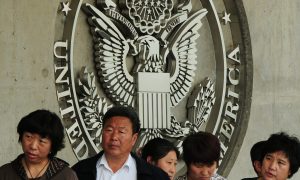US Senators Introduce Bill to Ban Visitor Visas to CCP Members
Four Republican U.S. senators have introduced a proposal that aims to provide greater scrutiny of visas for Chinese Communist Party (CCP) members.It would ban the issuance of nonimmigrant visas to the 93 million CCP members, according to a Nov. 17 statement by Marco Rubio (R-Fla.), the bill’s primary sponsor. The legislation would disincentivize Chinese nationals from joining the CCP and restrict the CCP’s espionage and propaganda operations in the United States, according to the statement. Currently, CCP members can enter the United States for vacation and perform non-official governmental business on 10-year, multi-entry B-1 and B-2 visas. Rubio said that every CCP member is tasked with accomplishing the Party’s goal to “weaken and undermine the United States” and “to become the world’s sole power.” “It defies common sense to allow CCP members to vacation, shop, or conduct business in our country,” Rubio said. Sen. Marco Rubio (R-Fla.) in Washington on Feb. 23, 2021. (Drew Angerer/Pool/AFP via Getty Images) The Risks Posed by CCP Co-sponsors included Sens. Kevin Cramer (R-N.D.), Rick Scott (R-Fla.), and Tommy Tuberville (R-Ala.). Cramer said in the statement that CIA-level clearance isn’t necessary to know China is a bad actor, and the Americans need a strategic decoupling from China. He noted that the CCP “actively works against the United States’ interests every day.” He believes this bill will provide greater scrutiny of visas for CCP members, regardless of how long they want to enter the country. “Communist China is our enemy and is on a quest for total world domination,” Scott said, referring to how the CCP agents come to the United States to steal intellectual property, track Chinese citizens, and infiltrate critical research institutions. However, he believes that many Chinese visitors are well-meaning and should be granted entry into the United States. But the federal government must mandate thorough vetting to ensure that visitors from Communist China aren’t CCP agents or associated with the CCP in any way, Scott said in the statement. He added, “I urge my colleagues to join us in supporting this good bill which will keep our country safe, keep foreign spies out of America and protect our valuable trade secrets.” The United States shouldn’t tolerate the blatant intellectual property theft by the CCP, Tuberville said. He indicated that the CCP’s increasingly hostile role on the world stage and willingness to orchestrate cyber and intellectual crime has made the Party the top adversary of the United States. He said, “It makes no sense to allow those who would harm the United States to lawfully enter our country for any reason.” “We must do everything we can to stop harmful foreign interference in our society and economy,” Tuberville stated. Chinese nationals who would still be eligible for other visa categories include diplomats, students, athletes/artists, exchange visitors, intracompany, physicians, and investors. Lin Yan contributed to this report. Follow Mary Hong has contributed to The Epoch Times since 2020. She has reported on Chinese human rights issues and politics.

Four Republican U.S. senators have introduced a proposal that aims to provide greater scrutiny of visas for Chinese Communist Party (CCP) members.
It would ban the issuance of nonimmigrant visas to the 93 million CCP members, according to a Nov. 17 statement by Marco Rubio (R-Fla.), the bill’s primary sponsor.
The legislation would disincentivize Chinese nationals from joining the CCP and restrict the CCP’s espionage and propaganda operations in the United States, according to the statement.
Currently, CCP members can enter the United States for vacation and perform non-official governmental business on 10-year, multi-entry B-1 and B-2 visas.
Rubio said that every CCP member is tasked with accomplishing the Party’s goal to “weaken and undermine the United States” and “to become the world’s sole power.”
“It defies common sense to allow CCP members to vacation, shop, or conduct business in our country,” Rubio said.

The Risks Posed by CCP
Co-sponsors included Sens. Kevin Cramer (R-N.D.), Rick Scott (R-Fla.), and Tommy Tuberville (R-Ala.).
Cramer said in the statement that CIA-level clearance isn’t necessary to know China is a bad actor, and the Americans need a strategic decoupling from China. He noted that the CCP “actively works against the United States’ interests every day.”
He believes this bill will provide greater scrutiny of visas for CCP members, regardless of how long they want to enter the country.
“Communist China is our enemy and is on a quest for total world domination,” Scott said, referring to how the CCP agents come to the United States to steal intellectual property, track Chinese citizens, and infiltrate critical research institutions.
However, he believes that many Chinese visitors are well-meaning and should be granted entry into the United States.
But the federal government must mandate thorough vetting to ensure that visitors from Communist China aren’t CCP agents or associated with the CCP in any way, Scott said in the statement.
He added, “I urge my colleagues to join us in supporting this good bill which will keep our country safe, keep foreign spies out of America and protect our valuable trade secrets.”
The United States shouldn’t tolerate the blatant intellectual property theft by the CCP, Tuberville said.
He indicated that the CCP’s increasingly hostile role on the world stage and willingness to orchestrate cyber and intellectual crime has made the Party the top adversary of the United States.
He said, “It makes no sense to allow those who would harm the United States to lawfully enter our country for any reason.”
“We must do everything we can to stop harmful foreign interference in our society and economy,” Tuberville stated.
Chinese nationals who would still be eligible for other visa categories include diplomats, students, athletes/artists, exchange visitors, intracompany, physicians, and investors.
Lin Yan contributed to this report.












